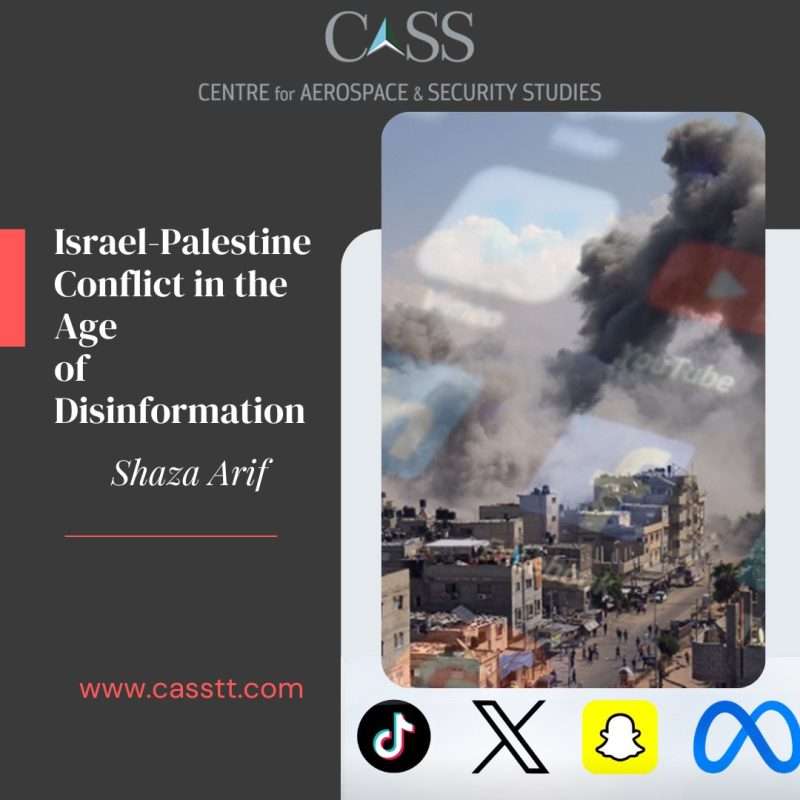Israel-Palestine conflict has been the lynchpin of Middle Eastern dynamics for more than several decades. While tensions never truly subsided between the warring sides, the protracted conflict has often taken a back seat, overshadowed by other global crises such as the invasion of Crimea, onset of the Pandemic, and the Russian-Ukraine war, etc. However, the recent heartbreaking hostilities that have transpired since 7th October have made it global headline news.
Amidst the ongoing chaos, a flow of information and disinformation has stormed the internet in the last three weeks. Even with limited electricity and internet, videos and images that bear witness to the ordeals of Palestinians are making their way to social media platforms, providing concrete evidence to the global audience regarding the collective suffering of people in Gaza. The haunting and harrowing visuals of rubble-strewn streets, abandoned towns, mass graves being hastily dug, people losing their loved ones, and parents mourning the loss of their innocent children are strong enough to evoke a profound response from the core of humanity, underscoring that grief has no nationality.
While most Muslim countries have always supported the Palestinian cause, pro-Palestinian protests have also been observed in Western countries. In the United States, United Kingdom, Scotland, Ireland, Sweden, France, Italy and Germany, thousands have expressed their solidarity with Palestine, including even certain Jewish communities. More empathy towards Palestinians is undoubtedly visible, and online platforms have certainly played a huge role in keeping the world informed of what’s happening on the ground in that region.
In parallel, the pace of online information is proceeding as fast as the conflict itself, with deep fakes, disinformation and misinformation taking new forms. X (formerly known as Twitter), YouTube, Facebook and TikTok, have also become breeding grounds for the circulation of misleading and outdated content claiming to originate from the conflict zone. For instance, a visual from the video game Arma 3 was circulated with the caption ‘Air Assault on Israel’. Likewise, an old video filmed in Egypt was claimed to be featuring Hamas fighters paragliding and crossing into Israel. In another case, an old video from the 2015 lynching video of a young girl in Guatemala was misrepresented online as an Israeli woman being burnt by a Palestinian mob. These incidents are just some of the many disinformation cases during the conflict. Resultantly, the European Union Commissioner Thierry Breton shared concerns regarding the inability of social media platforms to counter fake content and urged them to address disinformation regarding the conflict.
An important example in this regard is the platform X, once regarded as one of the most trustworthy platforms given its worldwide usage by governments and politicians alike for disseminating important and authentic news. However, the introduction of a new verification system based on a USD 8 subscription model has created considerable confusion due to the verification mark’s authenticity. Premium accounts now possess prioritised algorithmic ranking and searches, making them more frequent and prominent in the news feeds of other users. As per a new study, in the first week of the conflict, 74% of the most viral posts vis-à-vis misleading news of the incident were being spread by verified Twitter accounts. While some may deliberately spread disinformation for propaganda, others by mistake, the monetisation of Twitter may serve as another factor to share content that would invite more user engagement in return for financial incentives.
Online content – fake or real – can have offline consequences as it is not confined to mere pixels on the screen. Instead, it can be ingrained in the minds and hearts of people, shaping their broader understanding and perceptions. It has the potential to impact consciousness, beliefs and actions accordingly. The interplay of information and disinformation impacts public sentiment in Muslim countries and the West, alike. The extent to which these sentiments force governments to alter their policies is yet to unravel.
While technologies such as deepfakes have not seen widespread use, the ongoing genocide in Gaza illustrates that even without Artificial Intelligence (AI), recycled and photoshopped war images are powerful enough to shape narratives. Hence, the introduction of even more advanced technologies might further complicate societal and security dynamics. Moreover, while social media platforms, such as Meta, have been using AI to counter fake news, the inherent limitations of these tools have now been exposed. With the abundance of information, new social media policies and practices, it is getting considerably challenging for researchers to detect and identify misleading content. Gaza is another reminder that in an era where information and disinformation proliferate at an unprecedented rate, social media platforms must be made accountable for their content. Lastly, it also underpins individual responsibility to verify the visuals/information presented before propagating it further or taking sides.
This horrifying new chapter in the Israeli-Palestinian conflict has taken an intense turn. As the conflict unfolds on the ground, the parallel war on the digital frontier will reverberate across the regional and global landscapes. The interplay of history, conflict and technology has presented before us the pressing reality that while the physical divide may have been bridged in the digital age, it comes with added responsibility to critically hunt for and shine a light on the truth in the fog of information and disinformation.
Shaza Arif is a Research Assistant at the Centre for Aerospace & Security Studies (CASS), Islamabad, Pakistan. The article was first published in Pakistan Politico. She can be reached at: cass.thinkers@casstt.com.
Design Credit: Mysha Dua Salman




